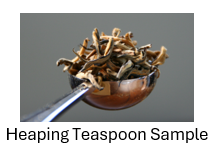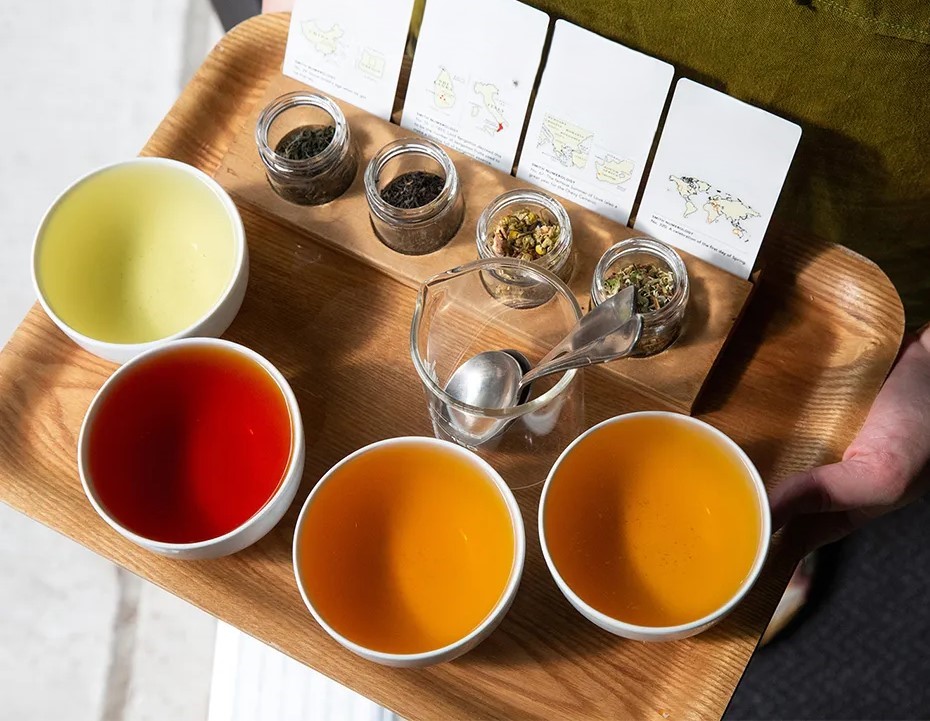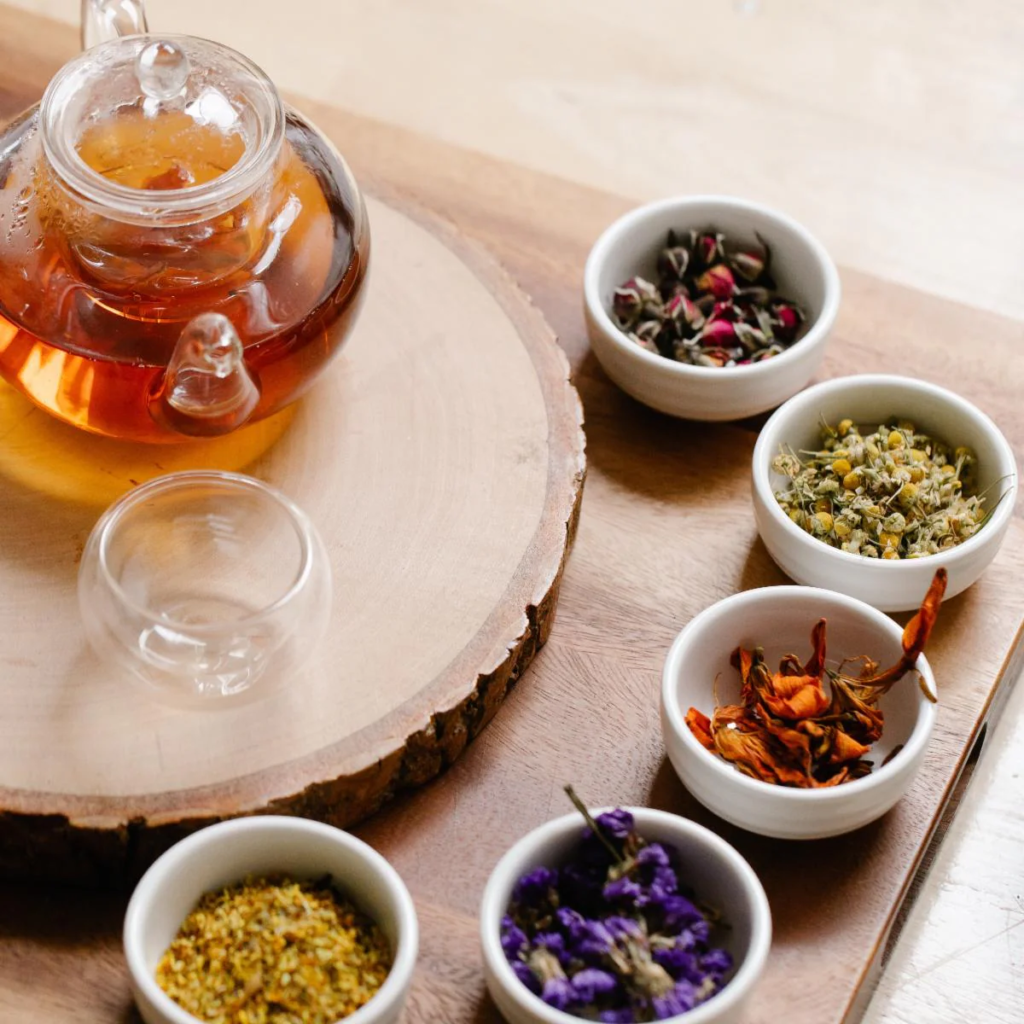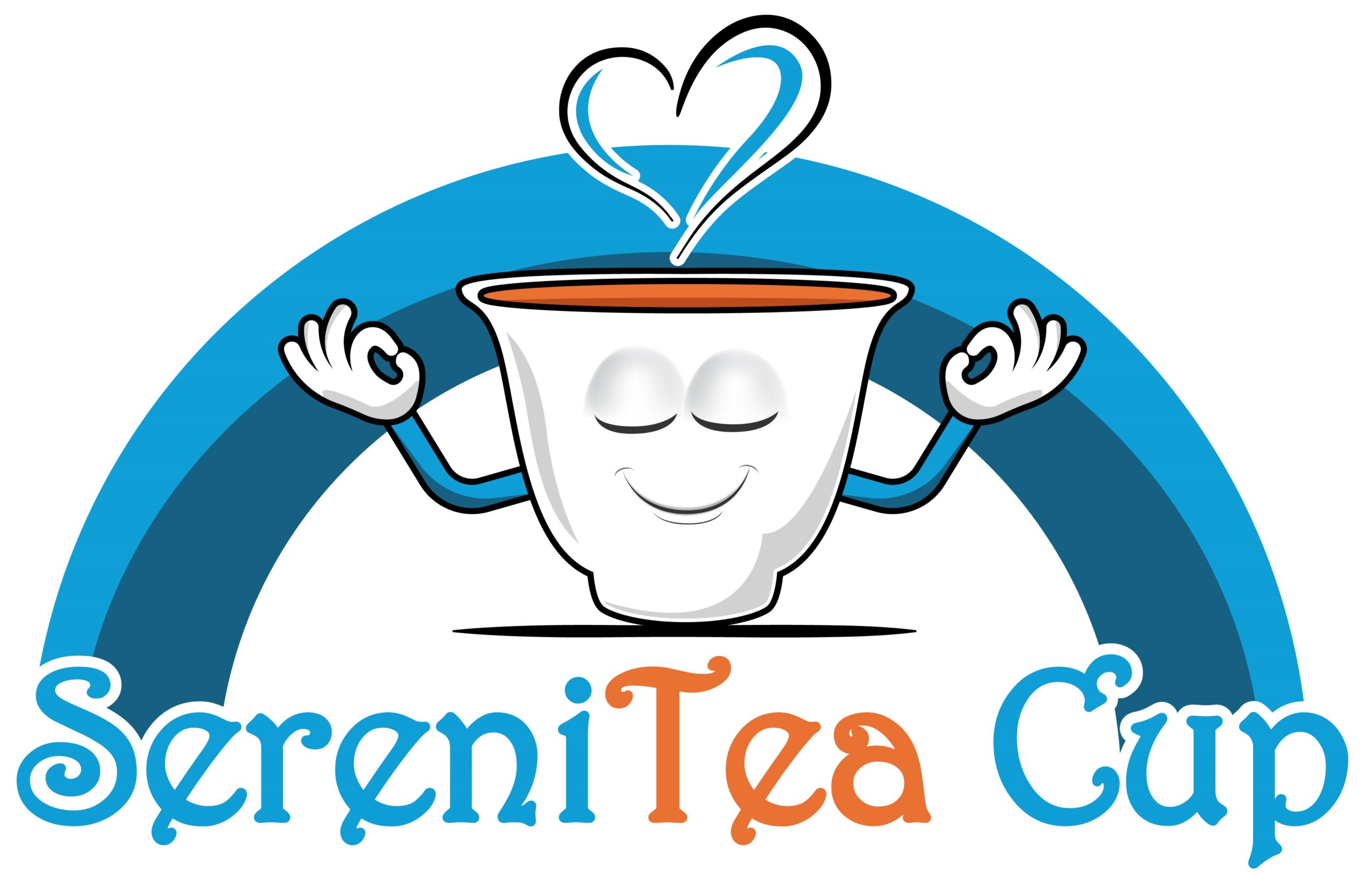FAQ
General
A heaping teaspoon is a unit of measurement that is larger than a level teaspoon.

Drinking tea may offer various health benefits.* Each type of tea can have unique health benefits depending on its specific ingredients and properties.
Black Tea
- Heart Health: May reduce the risk of heart disease by improving cholesterol levels and supporting healthy blood pressure.
- Mental Alertness: Contains caffeine, which can improve focus and concentration.
- Antioxidant Properties: Rich in polyphenols that protect cells from damage by free radicals.
Chai Tea
- Digestive Health: Often contains ginger and cinnamon, which can help soothe digestive issues and reduce nausea.
- Anti-Inflammatory Effects: Spices like cinnamon, ginger, and cardamom have anti-inflammatory properties.
- Immune Support: Cloves and cardamom in chai can help boost the immune system.
Green Tea
- Weight Management: Boosts metabolism and aids in fat oxidation.
- Antioxidant Properties: High in catechins, which protect cells from damage.
- Heart Health: May lower LDL cholesterol and improve heart health.
Herbal Tea
- Digestive Health: Varieties like peppermint and ginger tea can soothe digestive issues.
- Immune Support: Echinacea and elderberry teas can help boost the immune system.
- Anti-Inflammatory Effects: Teas like turmeric have anti-inflammatory properties.
Matcha Tea
- Antioxidant Properties: Extremely high in antioxidants, including EGCG, which protect cells from damage.
- Mental Alertness and Relaxation: Contains caffeine and L-theanine, promoting alertness and relaxation.
- Weight Management: Can enhance fat oxidation and boost metabolism.
Oolong Tea
- Weight Management: May help with weight loss by boosting metabolism and fat burning.
- Heart Health: Can improve cholesterol levels and support cardiovascular health.
- Antioxidant Properties: Contains polyphenols that protect cells from damage.
Pu-erh Tea
- Digestive Health: Can aid digestion and improve gut health.
- Cholesterol Management: May help lower LDL cholesterol levels.
- Antioxidant Properties: Rich in antioxidants that protect cells from damage.
Rooibos Tea
- Antioxidant Properties: Contains aspalathin, which may reduce inflammation and protect cells from damage.
- Heart Health: May help lower blood pressure and improve heart health.
- Digestive Health: Can soothe digestive issues and improve overall digestion.
White Tea
- Antioxidant Properties: High in catechins and polyphenols, which protect cells from damage.
- Skin Health: May help maintain healthy skin and reduce the effects of aging.
- Heart Health: Can improve cholesterol levels and support cardiovascular health.
While tea can offer these benefits, it's important to consume it as part of a balanced diet and healthy lifestyle.
*This information is NOT intended to diagnose, treat, or cure any medical condition. Please consult your healthcare provider or physician.
On-line Orders
We are unable to retroactively apply discounts once an order has been placed.
Discounts and/or promotions cannot be stacked. If you’ve already taken advantage of a discount or promotion, we will not be able to apply another one to your order.
Shipping
USPS and FedEx are our preferred shippers for all contiguous US orders. We offer multiple shipping options to ensure convenient delivery to various addresses.
Orders shipping to APO, AK, HI, AA, AP, AS, FM, GU, MH, MP, PW, PR, and VI are shipped via the US Postal Service. During checkout, USPS shipping will automatically apply to orders going to the regions listed above.
When your order ships, you will receive a shipping confirmation email, which includes either a FedEx or USPS tracking number.
You can also follow your order through your account on our website, you can find tracking information under “My Account” > “Past Orders / Shipments”.
Orders sent via FedEx can be tracked with the tracking number provided in your shipping confirmation email here- FedEx Tracking
Orders sent via USPS can be tracked with the tracking number provided in your shipping confirmation email here- USPS Tracking
Pending Status
When packages enter high-volume facilities, carriers automatically update the expected delivery date to pending. A new expected delivery date will be generated once the package has been further processed.
Returns
We are unable to accept returns or exchanges for our teas and botanicals, and we do not honor refunds if the issue is a matter of personal taste preference.
Please note that, as an agricultural product, some seasonal variance is to be expected in the flavor profiles of tea. For this reason, we recommend purchasing smaller quantities, such as our "Sample" size, ensuring the tea is to your liking before committing to larger bags.
We do honor replacements or website credit for quality issues. If you feel the quality of our products is less than expected, please contact our customer service within 30 days of your order date. We will need the order information and photos of the issue to process your inquiry.
Please contact our customer service at info@sereniteacup.com.
Unfortunately, you cannot return an opened and/or used accessory.
If you feel the quality of our products is less than expected, please contact our customer service within 30 days of your order date. We will need the order information and photos of the issue to process your inquiry.
We do not honor returns, exchanges, or refunds if the issue is a matter of personal taste.
Please note that, as an agricultural product, some seasonal variance is to be expected in the flavor profiles of tea. For this reason, we recommend purchasing smaller quantities, such as our “Sample” size, to ensure the tea is to your liking before committing to larger bags.
Caffeine
Caffeine is one of three stimulating alkaloids found in tea, the others being theobromine and theophylline. Theobromine is a mild stimulant found in greater concentration in chocolate.
In general, a brewed cup of tea has about 1/3 to 1/2 the caffeine of a cup of coffee. A cup of coffee has about 100-120 mg per 8 ounces. Most teas fall between 20-50 mg per 8 ounces. Contrary to popular myth, this average is true regardless of the type of tea (green tea, black tea, etc.). This makes sense when you consider that all true tea is made from a single plant species, Camellia sinensis.
The cultivar, or “cultivated variety,” is one of the most significant factors determining how much caffeine might be available in any given tea. Broad-leaf variety teas grown in Yunnan and Southeast Asia contain more caffeine than small-leaf varieties. But with hundreds of cultivars in existence, the range varies greatly.
Caffeine is more readily extracted at higher temperatures, so brewing tea at a higher temperature or for a longer period of time will result in a higher concentration of caffeine in your cup. For this reason, cold brew teas can contain less caffeine.
Tea types are differentiated by their processing steps. The techniques used to process fresh tea leaves– such as rolling, firing, oxidizing, or drying– do not alter caffeine on a molecular level, and thus they do not affect the amount of caffeine contained in the fresh leaf. Teas that undergo baking or roasting in their final stages, may lose some caffeine by pyrolysis, where the caffeine molecule is literally baked out of the tea leaves. In general, the processing methods do not affect caffeine content, so various types of tea can have similar levels of caffeine.
The cultivar of the tea plant is a greater factor influencing the amount of caffeine potential in tea. The brewing technique also plays a large role in determining how much caffeine is extracted into the final cup.
Most teas register within three tiers:
LOW: < 20 mg / 8oz cup MEDIUM: 20 – 40 mg / 8oz cup HIGH: > 40 mg / 8oz cup
An average cup of coffee contains about 90 – 120 mg / 8oz cup.
Tea & Food Safety
Similar to spices and coffee beans, dried tea leaves and powders will not “go bad” or spoil but can lose freshness over time. To maintain your tea’s quality, we recommend storing it in a resealable container away from direct sunlight, heat, moisture, and strong smells. Tea is hygroscopic—meaning it absorbs moisture and nearby aroma—so it is best to store teas away from other highly fragrant products like coffee, spices, or herbs.
A cool pantry or cupboard is perfect. Remember to gently push out any excess air when resealing the bag after use!
TIP! We sell tea canisters that are perfect for storing your tea.
The aim of the organic agriculture movement is to promote environmental sustainability by encouraging biodiversity, enhancing soil fertility and protecting the health of farm workers and consumers. In the US, organic agriculture and product labeling standards are regulated by a USDA certification program called the National Organic Program (NOP). The NOP certification prohibits the use of banned pesticides, herbicides, fungicides, growth hormones, GMOs, irradiation, sewage sludge, and artificial preservatives, flavors, and dyes in crops, livestock, and foods. Third-party certifying agencies make annual inspections to verify that an organic farmer, manufacturer, or product satisfies these standards. Compliant businesses are awarded the right to use the USDA Organic logo. You can look for this logo on a majority of our tea and botanicals.
Similar to spices and coffee beans, dried tea leaves and powders will not “go bad” but can lose the complexity of aroma and taste over time.
Each category of tea has a unique level of oxidation and freshness window:
Green and White:
Green and White teas will lose their freshness most quickly. We recommend consuming these teas within 2 months from the time you first open the package.
Matcha Powders:
Matcha powders should be enjoyed within 2 weeks upon opening the package because the powder will undergo “post-oxidation” when exposed to air, transforming its bright green color into a stale shade of pea-green or yellow. This can be minimized by using proper storage methods.
Oolong, Black, Chai, Rooibos, and Botanicals:
For the best flavor, we recommend using Oolong, Black, Chai, Rooibos, and Botanical teas within 4 months of opening the package.
Pu-erh and Roasted Oolong:
Lastly, roasted Oolong and Pu-erh teas have the unique ability to ripen and develop complexity with age over several years if stored properly.
A good rule of thumb:
- Know the category of tea
- Order what you can consume in the recommended freshness window
- Employ proper tea storage practices
Enjoy!




